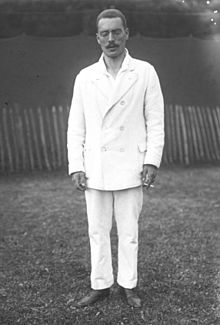Felix Pipes
In today's article we will address a topic of great relevance and interest to a wide audience. Felix Pipes is a fundamental starting point to understand the importance of this topic today. Throughout this article, we will explore different aspects related to Felix Pipes, analyzing its impact in various areas and its relevance in contemporary society. In addition, we will offer a series of reflections and recommendations that will allow our readers to delve deeper into this topic and understand its importance in a broader context. Join us on this informative and reflective journey about Felix Pipes!
 | ||||||||||||
| Full name | Fritz Felix Pipes | |||||||||||
|---|---|---|---|---|---|---|---|---|---|---|---|---|
| Country (sports) | Austria | |||||||||||
| Born | 15 April 1887 Prague Austria-Hungary | |||||||||||
| Died | 20 January 1983 (aged 95) Seattle, Washington, United States | |||||||||||
| Singles | ||||||||||||
| Other tournaments | ||||||||||||
| WHCC | 2R (1913) | |||||||||||
| Olympic Games | 1R (1908) | |||||||||||
Medal record
| ||||||||||||
Fritz Felix Pipes (also "Piepes"; 15 April 1887 – 20 January 1983)[1] was an Austrian tennis player who was born in Prague.[2] He was Jewish, and was a medical doctor.[3][2] At the 1912 Stockholm Olympics he teamed up with Arthur Zborzil to win a silver medal for Austria in the men's doubles event.[4]
He also competed for Austria in singles in 1912, and in both singles and doubles (with Zborzil) at the 1908 Summer Olympics.[2]
He was runner-up in the Austrian International Championship in both 1909 and 1913.[2] He twice played at the World Hard Court Championships, losing in round one of singles in 1912 and in the quarterfinals of mixed doubles in 1912, and in round two in 1913.[2]
See also
References
- ^ "Felix Pipes". Olympedia. Retrieved 12 April 2021.
- ^ a b c d e "Felix Pipes Olympic Results". sports-reference.com. Archived from the original on 3 February 2013. Retrieved 14 May 2013.
- ^ "Jewish Olympic Medalists". www.jewishsports.net.
- ^ Nauright, John; Parrish, Charles (2012). Sports Around the World: History, Culture, and Practice. ABC-CLIO. ISBN 9781598843002 – via Google Books.
External links
- Bergvall, Erik, ed. (1913). The Official Report of the Olympic Games of Stockholm 1912. Translated by Adams-Ray, Edward. Stockholm: Wahlström & Widstrand.
- Wudarski, Pawel (1999). "Wyniki Igrzysk Olimpijskich" (in Polish). Archived from the original on 16 February 2009. Retrieved 4 August 2007.